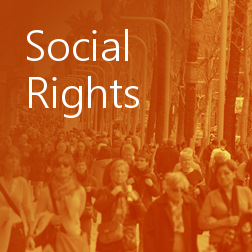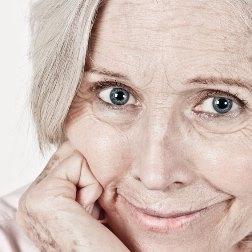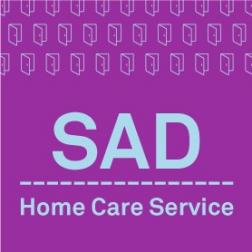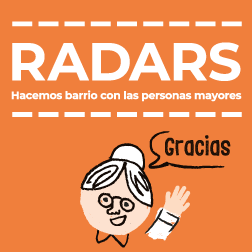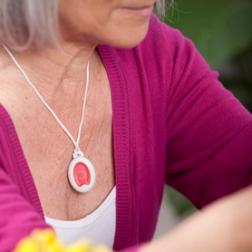"We are depriving older people of the possibility of imagining who they would be if they had more free time"
"We are depriving older people of the possibility of imagining who they would be if they had more free time"
30/09/2020 - 19:02
OLDER PEOPLE. How do old people distribute their time? How does our pace of life impact your health? On the occasion of the World Day of the Elderly, we interviewed the sociologist and expert on aging, Gabriela Del Valle Gómez.
The social use of time is also a determining factor in the development of those groups that do not carry out an activity within what we understand as “productive work”. We are talking, in this case, of the elderly. How do you distribute your free time? How does our rhythm of life affect the elderly on a physical and emotional level? On the occasion of the World Day of the Elderly, which is commemorated on October 1, we talked about time organization and the elderly with Gabriela Del Valle Gómez, a graduate in Information Sciences from the National University of Córdoba (Argentina), graduated in Sociology and Master in Applied Sociological Research from the Autonomous University of Barcelona. Del Valle has developed as a social researcher specialized in active aging issues at the Catalan Institute of Aging and the Health and Aging Foundation (2007-2015) of the Autonomous University of Barcelona (UAB).
What impact does the current organization of our time have on older people?
To understand the organization of time in older people, I think we have to reflect on how we learn to organize time throughout life. We must always bear in mind that aging is a process throughout life. It is not something that happens from one age, but it is many ages in a life.
From childhood we are educated to establish routines for the use of time around the mandate of institutions such as the family, school, work, self-care habits and, finally, free time.
If we remember, daily routines have been organized around the world of work. From a young age, they teach us how to organize days, vital phases, motherhood / fatherhood … everything revolves around productive work. Reproductive labor becomes invisible in this very tough machinery of socially “productive” performance.
A watch that leaves a forgotten time, inhabited by people but with no foresight of those who take care of their vital needs. Here, for example, there is work-life balance and care for dependents.
This is the time that older people contribute to society, in the life of each boy and girl, and of each person who needs continuous care.
It is worth saying that we must ask ourselves what happens to our time, because we dedicate so many hours to work or because we have become a bit hedonistic in the enjoyment of free time and we leave little time to share with older people inside or outside our network.
How is the time of older people currently distributed?
This depends on the life paths. It is difficult to generalize in relation to such a heterogeneous group. There are surveys that measure how much time we dedicate to different tasks of daily life, but in the substantive there is a meaning of time lived that may be different from time in a material sense. I think it is not enough to know how much time they dedicate to this or that activity, rather we should know how significant it is.
There are people who spend a lot of time doing the basic activities of daily life, because the goal is to maintain autonomy to avoid depending on the help of others. Living as we want is a milestone that we pursue all our lives, but sometimes this means being able to do everyday things independently (dressing, cooking, shopping, etc.).
There are also others who do a lot of socio-cultural activities, for example, they go to the nursing home, the civic center or they are volunteers, they struggle to stay active and autonomous. However, for some it is synonymous with well-being and for others a way to pass the time.
Finally, some people do few activities, take care of themselves, take walks, and take care of their family, if they have one.
It is also possible to answer this question from a generational point of view. The new generations of older people have cultural habits, for example, with very defined preferences. But this, once again, is a result of the lifestyle that we have forged throughout life. If we have been activists on gender issues, then we will have networks, knowledge, social skills related to it. Although, often, old age is an opportunity for great discoveries.
Be that as it may, there is a notable difference with respect to other generations (adults and young people): they spend more time on health care and have more free time. Two quality of life indicators. Transforming free time into wellness time is sometimes the challenge.
Are there differences between men and women at this age?
Sure, there have always been differences, why wouldn’t they be now? Caring is the answer, women take care of others, whether they are dependent or not! There are older women who spend a lot of time taking care of their partners with good health and full autonomy. It is not only the clean ones who are the recipients of care … But, it must be said that older men are initiating a process of change in this sense, they are beginning to star in care work, especially of their women and in some tasks of the care of the grandchildren. Undoubtedly, there is a generational factor that explains these changes, when the feminist discourse begins to settle socially, people change their daily habits.
In relation to free time, there are also differences. For example, men are part of sports clubs, or participate in neighborhood associations, once again it is what we have done throughout life that channels the use of time.
Women spend a lot of time doing social volunteer work, this has not changed in a long time, it is important to note that it could be linked to the habit of taking care of others.
There are new spaces such as training that are also led by women, the university extension classrooms are an example. Beyond demographic bias, there is also a gender issue, because it is a time when they can learn and train on issues that they have not been able to before due to the obligations of reproductive time.
Are we depriving grandparents and grandmothers of their free time and their possibilities for personal development?
Yes. We are not only depriving them of material time but also of the possibility of imagining who they would be with the availability of this time. There is nothing more evident than that time is life, or at least the possibility of living it.
The question is very well oriented, because it is a social problem. We must give a response as a society, from the private and public sphere, and commensurate community actions.
The care of grandchildren and granddaughters can in many cases be the main task of older people. Can this have consequences on your physical and mental health?
I believe that caring for our loved ones has a rewarding part and a very hard and demanding part. Sometimes we are in a position to respond to this link, but many times we are not. Fragility is part of our most human essence.
If you have worked your whole life, in a paid job or doing care work, and you have always wanted to enjoy this time for yourself and when the time comes you feel that you are ravaged, because that per se will have effects on your health emotional.
Childcare tasks require a lot of physical energy and moving at a “buzz” rhythm, you are not always in a position to do this, less when physical health is affected by chronic diseases, as is generally the case among older people. Physically it can worsen some ailments such as hypertension, osteoarthritis, osteoarticular diseases, back pain and sleep problems due to these pains.
From the psychological point of view, it can impact with anguish, anxiety and end in depression.
However, we cannot ignore the existence of studies on perceived health that indicate that older women who are caregivers of grandchildren have the perception of receiving more social support than others who are not caregivers. This care work is even recognized as a second chance for “positive parenting.”
How can an active aging of the elderly be promoted from the administration and also from the family sphere?
The local administration does a great job of disseminating the importance of staying active for healthy aging (sports, social participation, health). In any case, there is always a lot of work to be done, because the percentage of older people who carry out sociocultural and / or sports activities are a minority. We need to offer more opportunities or make them closer to the reality of all older people.
Now, it must be said that aging in an active and healthy way also means having sufficient material resources, a decent home, it means that basic rights are respected. If I live in a room without an elevator and I have functional mobility problems, this is a limit to my right to age with dignity. In addition, there are trajectories that remain invisible in relation to the “whirlwind” of the activity: people with disabilities, migrant elderly people, elderly people with diseases such as dementia, and so on.
In relation to the family, family conciliation is the pending issue for everyone. The family has a lot to do in the mandate to continue the work of caring for the descendants until the end of our lives. We can ask ourselves and respect their decisions, we can “limit” the length of time and intensity of care (currently, grandchildren take care of 6 hours a week on average), if they take care of less time and at times that require less physical effort it may represent greater wellness. We should also consider that perhaps such long vacations are not necessary and allocate that money to an external caregiver for our children, I don’t know, we must rethink the model of life. Sometimes children spend more time with grandparents and grandmothers than with their own mothers and fathers!
Should the social and health crisis of Covid19 help us to rethink our interdependent relationships? What role should older people play in the “new normal”?
Every time I think about the impact of Covidien-19 on older people, the reality becomes, more than ever, complex and surprising. I think they have suffered violations of rights of all kinds, in a flagrant way, on this there is a specific analysis. But I also think they have been an example of resilience, as always. Regarding interdependence, he has noted the absence of intra-family interaction during confinement, but in an unsatisfactory way. If before we talked about the need to free older people from time to care for others, obviously these are not the optimal conditions, nothing further! As some psychoanalysts say “nothing is liberating if the fear it generates can block your growth”.
But if we think on the positive side, we can take as an example adaptation to the use of communication technologies. Many older people have made use of mobile phones, tablets, zoom, meet, jitsi, to communicate with their children and grandchildren. And if they have not done it themselves, the support staff has helped them, for example, in the residences. This is not enough, but it has been a way to adapt and reduce emotional distress and the risk of contagion.
There is another side, more difficult, loneliness experienced as something heavy, or the emotional distance of children and other relatives. But this was a pre-existing factor that represented a risk of greater vulnerability. This that we sociologists have been analyzing for years was present in the worst circumstances. Further, there have been very positive civil society actions, such as the wasap groups to take care of the elderly on the scale, or the actions of the administration to ensure the continuity of services such as the meal each day, or the third sector that has done a tireless job of accompanying elderly people who suffer from loneliness. We must always bear in mind that interdependence is social, it challenges us all, individually, in groups, or as collective actors.
The “new normal”, although I wonder what that is and discover step by step what its implications are. Older people should be the protagonists of policies, of community actions, of our actions as citizens … But is this really so?
Who takes care of your rights? Do we hear their voices? Do we respect your decisions? Does society leave you room to decide about your lives? What resources are we allocating to reduce risks? A simple question: when you return to work with protective measures, who will pick up the children from school? Who (pre) cares for these types of contagion risk? And I am not saying precisely because of the children, but because of the interactions that may take place on the necessary journeys, worse if you have to use public transport … How do the media speak of older people? What role do you think they will have according to the speech they make?
I believe that nothing has been done in this regard, it gives the impression that we are waiting for the vaccine to save us our own inhumanity, incompetence, inoperability, as a society. The vaccine will not save us from ourselves.



